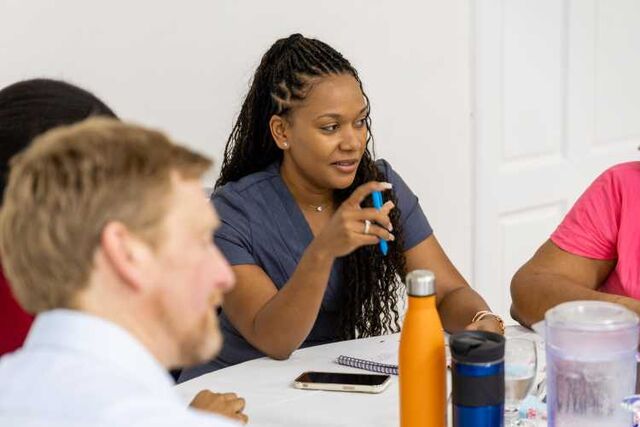Common Seas and Department of Sustainable Development unwrap Saint Lucia’s plastic waste challenge
- A comprehensive analysis showed the island produced around 12,000 tonnes of plastic waste in 2024.
- Single-use plastics make up almost half of the island’s annual plastic waste, highlighting an opportunity to significantly reduce plastic waste and pollution.
- Common Seas and Unite Caribbean shared the insights and the impact of proposed policies at a workshop with key stakeholders.
Common Seas, working with the Department of Sustainable Development, and local partners Unite Caribbean, has completed a comprehensive baseline analysis of Saint Lucia’s plastic waste generation and leakage.
This marked the first major step in a project to assess the scale of Saint Lucia’s plastic waste generation and leakage and strengthen the island’s response through evidence-based policy design and implementation.
The analysis, powered by Common Seas’ UN-endorsed Plastic Drawdown tool, was presented in January 2025, at a Plastic Baseline and Policy Workshop attended by over 40 stakeholders across Saint Lucia’s plastic value chain.
The frontline of plastic pollution
Small Island Developing States, sometimes referred to as Large Ocean States, are custodians of nearly a third of the world’s ocean, averaging 96% ocean by area. They play a crucial role in the fight against marine plastic pollution.
With 11 million metric tonnes of plastic entering our oceans every year, these countries are on the frontlines of the plastics crisis. Limited access to waste management and large volumes of waste washing up on their shores make plastic pollution a major threat to their environment, public health and economies.
Background to the analysis
In 2019, The Caribbean Community (CARICOM) adopted a regional strategy for the management of marine litter and microplastics. It was the first regional declaration of its kind that acknowledges the adverse impacts of increasing levels of plastics and microplastics within the Caribbean Sea and Atlantic Ocean. The declaration challenges governments to support a holistic approach to solid waste and plastic management.
Common Seas’ project lead, Zinnie Cowing explains: “We have been working closely with government agencies and local stakeholders, drawing on a wide range of existing data, to map how plastic flows through waste pathways in Saint Lucia. We then modelled the impact of current and proposed policies to curb marine litter.
“As a proud Saint Lucian, I’m delighted to be working with the Department of Sustainable Development and our local partners to protect Saint Lucia from plastic pollution. Together we can help to preserve the natural beauty and marine ecosystems Saint Lucians depend on.”
Baseline findings
Initial findings reveal that Saint Lucia generates around 12,000 tonnes of plastic waste each year, nearly half of which is made up of single-use plastics. This presents a significant opportunity for reductions in waste volumes through the development of ‘upstream’ solutions that reduce the amount of plastic waste generated.

Since the workshop, the project partners have now started work to create a roadmap for reducing plastic waste generation and pollution, aligned with, and strengthening the Marine Litter Management Action Plan (ML-MAP). This work is expected to be completed in July 2025.
Building on strong foundations
Saint Lucia’s Marine Litter Management Action Plan (ML-MAP) was published in November 2022 to address the pressing issue of marine litter affecting its coastal and marine ecosystems. The primary objectives of the plan are:
- To prevent plastic waste leakage into the environment
- Reduce marine litter accumulation in nearshore environments, and
- Enhance national and international collaboration to address both local and global marine litter challenges.
Common Seas will assessing and provide recommendations for seven activities in the ML-MAP, and three additional activities with the potential to further reduce waste leakage.
Funding from UK International Development
The programme is funded by UK International Development through the UK government’s Sustainable Blue Economies (SBE) Programme, which aims to enhance the resilience of Small Island Developing States (SIDS).
Under the programme, Common Seas will partner with five Small Island Developing States (SIDS) to develop National Action Plans to tackle plastic pollution.
This critical funding is allowing us to develop and scale an approach tailored to the unique challenges and needs of SIDS, which are disproportionately affected by the plastic crisis. The project will support partner governments to radically reduce ocean plastic in their countries over the course of ten years and contribute to a sustainable blue economy.
Common Seas has previously worked with the governments of Maldives, Barbados, and The Gambia and is currently working with Grenada, Guinea-Bissau, Papua New Guinea, Saint Lucia, and Tuvalu on programmes to end plastic pollution in the next decade. Ultimately, they aim to support partner governments to significantly reduce ocean plastic pollution in their countries over the course of the next ten years.
About Plastic Drawdown
Plastic Drawdown was developed in partnership with 24 governments, more than half of whom are Small Island Developing States (SIDS) and is designed to support national decision-makers to prioritise and implement the most impactful policies.
About the Sustainable Blue Economies Programme
The Sustainable Blue Economies (SBE) programme aims to enhance the resilience of ODA-eligible Small Island Developing States (SIDS) and their economies to the impacts of climate change and economic shocks, including through better ocean management, poverty reduction/improved livelihoods and greater use of nature-based solutions (NbS).
The six-year programme, announced by the UK Prime Minister at CHOGM in July 2022 is a commitment of the UK Government to support developing countries in protecting their marine environment and reducing poverty.


